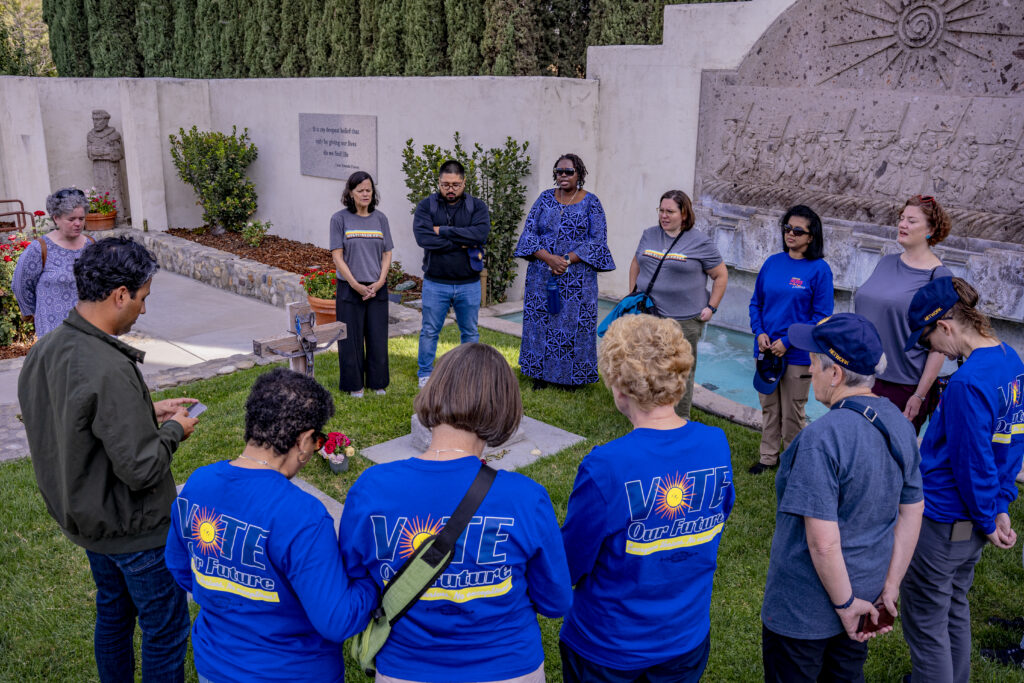Not on Our Watch, Not in Our Name
Resistance and Persistence Build Community as We Search for Hope
Sr. Eilis McCulloh, HM
November 13, 2025
The horrors of this current administration feel like they are coming at us rapid fire. As we at NETWORK have said for months, this is by design — with the hope that we, people united for the common good, lose focus in all of the chaos. They hope that we become burned out by everything that is happening at warp speed and lose steam. And, truth be told, we are tired, but we are not slowing down.

Sr. Eilis McCulloh, HM joined by Sr. Barbara Batista, SP, Sr. Dani Braught, ASC, and Meg Olson, NETWORK Director of Grassroots Mobilization during the Pilgrimage of Hope at the annual August gathering of the Leadership Conference of Women Religious in Atlanta. The Pilgrimage of Hope was a one-mile walk through downtown Atlanta prayerfully dedicated to addressing systemic injustice in the areas of racism, migration, and the climate crisis.
Years ago, I heard the phrase that we are called to touch the pain of the world. It felt heavy when I could not respond to all the pain in the world. Now this has taken many different forms, but I truly believe that touching the pain of this country and responding to it is a way that we all can practice accountability in 2025.
We need to know where our community is hurting—be it by an increased military presence patrolling our streets, immigration raids terrifying our neighbors, hospitals closing, or a lack of available food. As we become aware of the pain and devastation in our communities, we must be moved to act. This is our current form of contemplation in action and courageously speaking truth to power.
We are called not only to stand in the chasms—in the wake of raids, slashed funding, and fear—but to respond to it. We are called to be the tangible opposition to these horrors and advocates for a better tomorrow. No matter where we live, our walk of life, or whether we’re college students or senior citizens, we are called to be an active form of resistance against the degradation of our democracy and our communities.
As Bishop Marianne Budde recently wrote: “We can rise to this moment, to do our part to stop those who are determined to dismantle the institutions, destroy the guardrails of our democracy, and accelerate the very trends we need to reverse for the human species to survive.”
We are rising to the moment.
We call our Members of Congress. We send emails. We write letters to the editor. We put up billboards, pass out zines, attend workshops and webinars. We talk to our friends and family. Why? To hold our elected officials accountable and maybe, in some ways, to hold ourselves accountable to planting seeds for the greater good of our country.
Across the country, our Sisters and friends have been holding vigil at immigration detention centers, offering prayers and solidarity to those unjustly detained and their family members. In song and prayer, we line local streets with signs that say things like “Protect Families, Reject Deportation.”
This witness says to the wider community: This cannot happen in our name. We are hosting
letter writing campaigns and call-in days, continually widening the circle by inviting friends, neighbors, family, and community members to participate. Through these invitations, we’ve heard from so many who made their first phone call. And it wasn’t so scary after all!
Through it all, we are rooted in community. Each time we join a vigil, protest, or webinar, we meet new people who share our passion. We build bridges. We resist together. We learn together. We celebrate together.
As Bishop Budde said in the same reflection: “We are the ones who must dare to believe that seeds of new possibilities, invisible to us now, have already been planted in the soil of our lives, and they are slowly taking root. New life will emerge from the ashes of what is lost.”
It might not feel like there is a lot of new life emerging in the here and now. But I see it springing forth from every person crowded around tables folding zines, every street lined with people, every chapel filled with people praying, and every meeting room where people are gathered.
We are part of the movement to create An Economy for All, where all people, no matter their economic status, citizenship status, orientation, or ZIP code, have what they need to thrive.
Sr. Eilis McCulloh, HM is a Sister of the Humility of Mary and NETWORK’s Grassroots Education and Organizing Coordinator. This “Spirited Sisters” column originally appeared in the Quarter 4 2025 issue of NETWORK’s Connection magazine.









